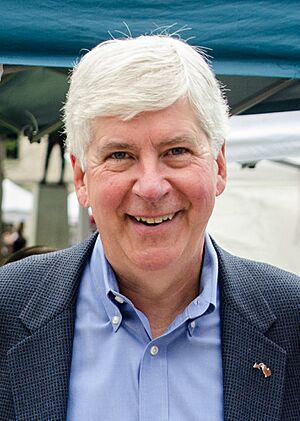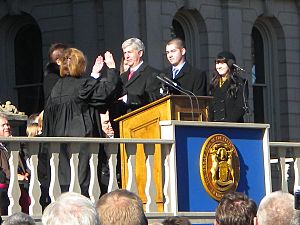Rick Snyder facts for kids
Quick facts for kids
Rick Snyder
|
|
|---|---|

Snyder in 2017
|
|
| 48th Governor of Michigan | |
| In office January 1, 2011 – January 1, 2019 |
|
| Lieutenant | Brian Calley |
| Preceded by | Jennifer Granholm |
| Succeeded by | Gretchen Whitmer |
| Personal details | |
| Born |
Richard Dale Snyder
August 19, 1958 Battle Creek, Michigan, U.S. |
| Political party | Republican |
| Spouse |
Sue Snyder
(m. 1987) |
| Children | 3 |
| Education | University of Michigan (BGS, MBA, JD) |
| Signature | |
Richard Dale "Rick" Snyder (born August 19, 1958) is an American businessman and politician. He served as the 48th governor of Michigan from 2011 to 2019. Before becoming governor, Snyder worked as a business leader, an accountant, and an attorney.
Snyder was born in Battle Creek, Michigan. He worked as a top executive at the computer company Gateway and started several other businesses. As a member of the Republican Party, he was elected governor in 2010 and re-elected in 2014. Because of term limits, he could not run for a third time in 2018.
During his time as governor, Snyder became known nationally for the Flint water crisis. This was a public health emergency where the water in Flint, Michigan, became contaminated with lead. Many people criticized how he handled the situation. After leaving office, Snyder has continued to work in business, focusing on cybersecurity.
Contents
Early Life and Education
Rick Snyder was born in Battle Creek, Michigan. His father, Dale, owned a window-cleaning business. Even as a teenager, Snyder was very focused on his education. He took college classes on weekends while he was still in high school.
He attended the University of Michigan for all of his higher education. He earned three degrees there:
- A bachelor's degree in 1977
- A Master of Business Administration (MBA) in 1979
- A law degree (Juris Doctor) in 1982
Snyder is also a Certified Public Accountant (CPA), which means he is a professional accountant. He and his wife, Sue, have three children and live in Ann Arbor, Michigan.
Business Career
Before entering politics, Rick Snyder had a long career in the business world. He used his skills in accounting, law, and business management to lead several companies.
Early Career
From 1982 to 1991, Snyder worked for Coopers & Lybrand, a large accounting firm. He started in the Detroit office and later became a partner in the Chicago office, where he worked on mergers and acquisitions (when companies join together).
Gateway Computers
In 1991, Snyder joined Gateway, a major computer company. He held important roles, including president and chief operating officer. He was also the chairman of the board from 2005 to 2007. He even served as the temporary CEO in 2006 while the company searched for a new leader.
Investing and Startups
After Gateway, Snyder became a venture capitalist. A venture capitalist is someone who invests money in new, small companies (called startups) to help them grow. In 1997, he started his own investment company called Avalon Investments.
In 2000, he co-founded another firm called Ardesta, which invested in about 20 different startup companies. He also helped start HealthMedia, Inc., a company that created online health coaching programs.
Running for Governor
In 2010, Rick Snyder decided to run for governor of Michigan. He had never held a political office before. His campaign focused on his business experience. He said he was "one tough nerd" who could use his skills to fix Michigan's economy and create jobs.
He competed against several other Republicans to become the party's nominee. He won the Republican primary election in August 2010. In the main election in November, he faced the Democratic candidate, Virg Bernero. Snyder won the election with 58% of the vote.
In 2014, Snyder ran for re-election. He faced Democratic candidate Mark Schauer. It was a close race, but Snyder won a second term as governor with about 51% of the vote.
Governor of Michigan (2011–2019)
Rick Snyder became governor on January 1, 2011. During his eight years in office, he signed many new laws and made major changes to the state's government and economy.
First Term Actions
One of Snyder's first acts was to split the Department of Natural Resources and Environment into two separate departments. He wanted one to focus on natural resources and the other on environmental quality.
His first budget proposed large spending cuts and tax changes. He replaced the state's business tax with a simpler, flat tax. Some people praised these changes for improving Michigan's economy, while others criticized them for hurting families and seniors.
In 2011, Snyder signed a law that gave more power to state-appointed emergency managers. These managers could be sent to cities and school districts with serious financial problems. This law was controversial because it took power away from locally elected officials.
In 2012, Snyder signed a "right-to-work" law. This law says that workers cannot be required to join a union or pay union fees as a condition of their employment. This was a major change for Michigan, a state with a long history of powerful labor unions.
Second Term and Beyond
In his second term, Snyder continued to focus on economic issues. He traveled to other countries, like Israel, to encourage foreign companies to invest in Michigan.
In 2013, he declared a financial emergency in the city of Detroit and appointed an emergency manager, Kevyn Orr. This led to the largest municipal bankruptcy in U.S. history. The city was able to restructure its debt and get back on its feet.
Snyder also created the Michigan Department of Talent and Economic Development. This new agency was designed to bring together different state offices that worked on job creation and workforce training.
Flint Water Crisis
The most difficult event during Snyder's time as governor was the Flint water crisis.
In 2014, the city of Flint, which was under the control of a state-appointed emergency manager, changed its water source to the Flint River to save money. The river water was not treated properly. It was very corrosive, meaning it damaged the city's old water pipes.
This caused dangerous amounts of lead from the pipes to get into the drinking water. For more than a year, residents of Flint drank and bathed in lead-contaminated water. Lead is very harmful, especially to children.
Snyder's government was slow to respond to the problem. For months, state officials said the water was safe, even as residents complained about its color, smell, and taste. In 2015, studies by doctors and scientists proved that the water was poisoning Flint's children.
Snyder eventually declared a state of emergency and switched Flint back to its original water source. But by then, a lot of damage had been done. He was heavily criticized for how he and his administration handled the crisis. Many people, including Flint residents and public health experts, blamed him for the disaster. Snyder later apologized for the government's failures.
Life After Politics
Rick Snyder's second term as governor ended in January 2019. After leaving office, he started a business consulting company.
In 2020, Snyder endorsed Joe Biden, a Democrat, for president. He said that he disagreed with President Donald Trump's leadership style. In 2022, Snyder co-founded SensCy, a cybersecurity company that helps small and medium-sized businesses protect themselves from online threats.
| Party | Candidate | Votes | % | |
|---|---|---|---|---|
| Republican | Rick Snyder | 381,327 | 36.4 | |
| Republican | Pete Hoekstra | 280,976 | 26.8 | |
| Republican | Mike Cox | 240,409 | 23.0 | |
| Republican | Mike Bouchard | 127,350 | 12.2 | |
| Republican | Tom George | 16,986 | 2.0 | |
| Total votes | 1,044,925 | 100 | ||
| Michigan gubernatorial election, 2010 | |||||
|---|---|---|---|---|---|
| Party | Candidate | Votes | % | ±% | |
| Republican | Rick Snyder | 1,874,834 | 58.11% | +15.81% | |
| Democratic | Virg Bernero | 1,287,320 | 39.90% | -16.46% | |
| Libertarian | Ken Proctor | 22,390 | 0.69% | +0.08% | |
| Constitution | Stacey Mathia | 20,818 | 0.65% | +0.46% | |
| Green | Harley Mikkelson | 20,699 | 0.64% | +0.12% | |
| Majority | 587,514 | 18.21% | +4.15% | ||
| Turnout | 3,226,088 | ||||
| Republican gain from Democrat | Swing | ||||
| Michigan gubernatorial election, 2014 | |||||
|---|---|---|---|---|---|
| Party | Candidate | Votes | % | ±% | |
| Republican | Rick Snyder (incumbent) | 1,607,399 | 50.92% | -7.19% | |
| Democratic | Mark Schauer | 1,479,057 | 46.86% | +6.96% | |
| Libertarian | Mary Buzuma | 35,723 | 1.13% | +0.44% | |
| Constitution | Mark McFarlin | 19,368 | 0.61% | -0.04% | |
| Green | Paul Homeniuk | 14,934 | 0.47% | -0.17% | |
| Write-ins | 50 | 0.00% | 0.00% | ||
| Majority | 128,342 | 4.06% | -14.15% | ||
| Turnout | 3,156,531 | -2.16% | |||
| Republican hold | Swing | ||||
See also
 In Spanish: Rick Snyder para niños
In Spanish: Rick Snyder para niños
 | Tommie Smith |
 | Simone Manuel |
 | Shani Davis |
 | Simone Biles |
 | Alice Coachman |





